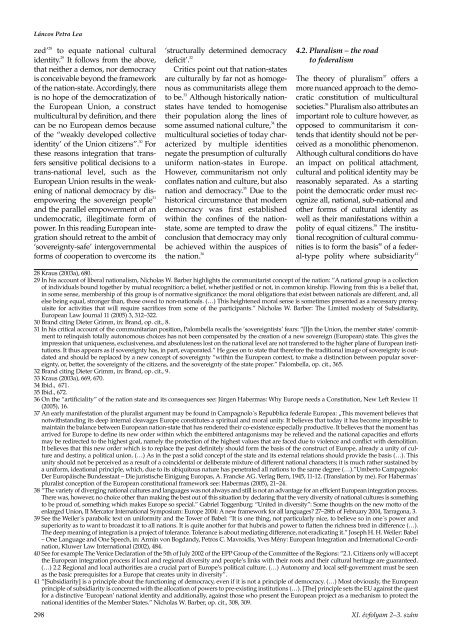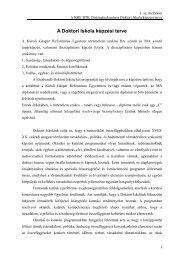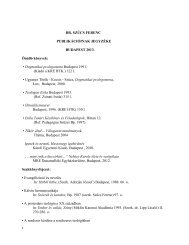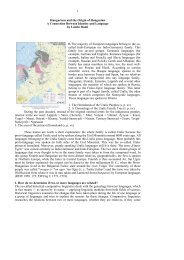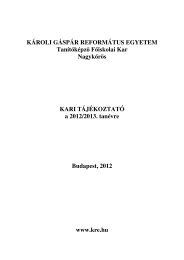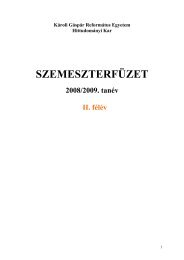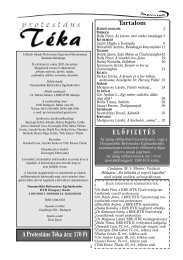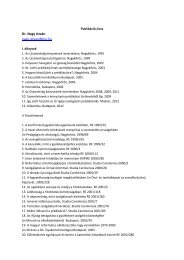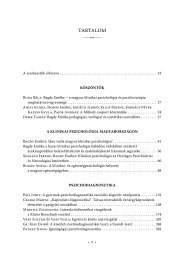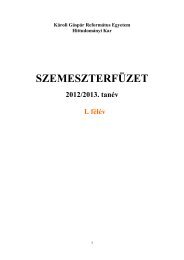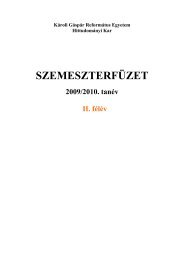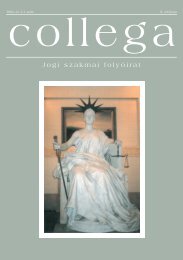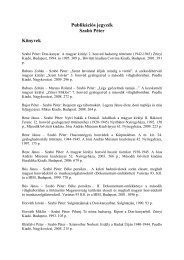collega - Károli Gáspár Református Egyetem
collega - Károli Gáspár Református Egyetem
collega - Károli Gáspár Református Egyetem
You also want an ePaper? Increase the reach of your titles
YUMPU automatically turns print PDFs into web optimized ePapers that Google loves.
Láncos Petra Lea<br />
zed’ 28<br />
to equate national cultural<br />
identity. 29<br />
It follows from the above,<br />
that neither a demos, nor democracy<br />
is conceivable beyond the framework<br />
of the nation-state. Accordingly, there<br />
is no hope of the democratization of<br />
the European Union, a construct<br />
multicultural by definition, and there<br />
can be no European demos because<br />
of the “weakly developed collective<br />
identity’ of the Union citizens”. 30 For<br />
these reasons integration that transfers<br />
sensitive political decisions to a<br />
trans-national level, such as the<br />
European Union results in the weakening<br />
of national democracy by disempowering<br />
the sovereign people 31<br />
and the parallel empowerment of an<br />
undemocratic, illegitimate form of<br />
power. In this reading European integration<br />
should retreat to the ambit of<br />
‘sovereignty-safe’ intergovernmental<br />
forms of cooperation to overcome its<br />
‘structurally determined democracy<br />
deficit’. 32<br />
Critics point out that nation-states<br />
are culturally by far not as homogenous<br />
as communitarists allege them<br />
to be. 33 Although historically nationstates<br />
have tended to homogenise<br />
their population along the lines of<br />
some assumed national culture, 34 the<br />
multicultural societies of today characterized<br />
by multiple identities<br />
negate the presumption of culturally<br />
uniform nation-states in Europe.<br />
However, communitarism not only<br />
conflates nation and culture, but also<br />
nation and democracy. 35<br />
Due to the<br />
historical circumstance that modern<br />
democracy was first established<br />
within the confines of the nationstate,<br />
some are tempted to draw the<br />
conclusion that democracy may only<br />
be achieved within the auspices of<br />
the nation. 36<br />
4.2. Pluralism – the road<br />
to federalism<br />
The theory of pluralism 37<br />
offers a<br />
more nuanced approach to the democratic<br />
constitution of multicultural<br />
societies. 38 Pluralism also attributes an<br />
important role to culture however, as<br />
opposed to communitarism it contends<br />
that identity should not be perceived<br />
as a monolithic phenomenon.<br />
Although cultural conditions do have<br />
an impact on political attachment,<br />
cultural and political identity may be<br />
reasonably separated. As a starting<br />
point the democratic order must recognize<br />
all, national, sub-national and<br />
other forms of cultural identity as<br />
well as their manifestations within a<br />
polity of equal citizens. 39 The institutional<br />
recognition of cultural communities<br />
is to form the basis 40 of a federal-type<br />
polity where subsidiarity 41<br />
28 Kraus (2003a), 680.<br />
29 In his account of liberal nationalism, Nicholas W. Barber highlights the communitarist concept of the nation: “A national group is a collection<br />
of individuals bound together by mutual recognition; a belief, whether justified or not, in common kinship. Flowing from this is a belief that,<br />
in some sense, membership of this group is of normative significance: the moral obligations that exist between nationals are different, and, all<br />
else being equal, stronger than, those owed to non-nationals. (…) This heightened moral sense is sometimes presented as a necessary prerequisite<br />
for activities that will require sacrifices from some of the participants.” Nicholas W. Barber: The Limited modesty of Subsidiarity,<br />
European Law Journal 11 (2005) 3, 312–322.<br />
30 Brand citing Dieter Grimm, in: Brand, op. cit., 8.<br />
31 In his critical account of the communitarian position, Palombella recalls the ‘sovereigntists’ fears: “[I]n the Union, the member states’ commitment<br />
to relinquish totally autonomous choices has not been compensated by the creation of a new sovereign (European) state. This gives the<br />
impression that uniqueness, exclusiveness, and absoluteness lost on the national level are not transferred to the higher plane of European institutions.<br />
It thus appears as if sovereignty has, in part, evaporated.” He goes on to state that therefore the traditional image of sovereignty is outdated<br />
and should be replaced by a new concept of sovereignty “within the European context, to make a distinction between popular sovereignty,<br />
or, better, the sovereignty of the citizens, and the sovereignty of the state proper.” Palombella, op. cit., 365.<br />
32 Brand citing Dieter Grimm, in: Brand, op. cit., 9.<br />
33 Kraus (2003a), 669, 670.<br />
34 Ibid., 671.<br />
35 Ibid., 672.<br />
36 On the “artificiality” of the nation state and its consequences see: Jürgen Habermas: Why Europe needs a Constitution, New Left Review 11<br />
(2005), 16.<br />
37 An early manifestation of the pluralist argument may be found in Campagnolo´s Repubblica federale Europea: „This movement believes that<br />
notwithstanding its deep internal cleavages Europe constitutes a spiritual and moral unity. It believes that today it has become impossible to<br />
maintain the balance between European nation-state that has rendered their co-existence especially productive. It believes that the moment has<br />
arrived for Europe to define its new order within which the embittered antagonisms may be relieved and the national capacities and efforts<br />
may be redirected to the highest goal, namely the protection of the highest values that are faced due to violence and conflict with demolition.<br />
It believes that this new order which is to replace the past definitely should form the basis of the construct of Europe, already a unity of culture<br />
and destiny, a political union. (…) As in the past a solid concept of the state and its external relations should provide the basis (…). This<br />
unity should not be perceived as a result of a coincidental or deliberate mixture of different national characters; it is much rather sustained by<br />
a uniform, ideational principle, which, due to its ubiquitous nature has penetrated all nations to the same degree (…).”Umberto Campagnolo:<br />
Der Europäische Bundesstaat – Die juristische Einigung Europas, A. Francke AG. Verlag Bern, 1945, 11-12. (Translation by me). For Habermas´<br />
pluralist conception of the European constitutional framework see: Habermas (2005), 21–24.<br />
38 “The variety of diverging national cultures and languages was not always and still is not an advantage for an efficient European integration process.<br />
There was, however, no choice other than making the best out of this situation by declaring that the very diversity of national cultures is something<br />
to be proud of, something which makes Europe so special.” Gabriel Toggenburg: “United in diversity”: Some thoughts on the new motto of the<br />
enlarged Union, II Mercator International Symposium: Europe 2004: A new framework for all languages? 27–28th of February 2004, Tarragona, 3.<br />
39 See the Weiler´s parabolic text on uniformity and the Tower of Babel: “It is one thing, not particularly nice, to believe so in one´s power and<br />
superiority as to want to broadcast it to all nations. It is quite another for that hubris and power to flatten the richness bred in difference (…).<br />
The deep meaning of integration is a project of tolerance. Tolerance is about mediating difference, not eradicating it.” Joseph H. H. Weiler: Babel<br />
– One Language and One Speech, in: Armin von Bogdandy, Petros C. Mavroidis, Yves Mény: European Integration and International Co-ordination,<br />
Kluwer Law International (2002), 484.<br />
40 See for example The Venice Declaration of the 5th of July 2002 of the EPP Group of the Committee of the Regions: “2.1. Citizens only will accept<br />
the European integration process if local and regional diversity and people’s links with their roots and their cultural heritage are guaranteed.<br />
(…) 2.2 Regional and local authorities are a crucial part of Europe’s political culture. (…) Autonomy and local self-government must be seen<br />
as the basic prerequisites for a Europe that creates unity in diversity”.<br />
41 “[Subsidiarity] is a principle about the functioning of democracy, even if it is not a principle of democracy. (…) Most obviously, the European<br />
principle of subsidiarity is concerned with the allocation of powers to pre-existing institutions (…). [The] principle sets the EU against the quest<br />
for a distinctive ’European’ national identity and additionally, against those who present the European project as a mechanism to protect the<br />
national identities of the Member States.” Nicholas W. Barber, op. cit., 308, 309.<br />
298 XI. évfolyam 2–3. szám


